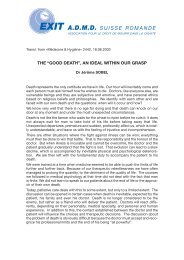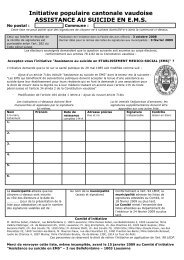Exit - Example Ass. sui. (A) - Association EXIT Suisse romande
Exit - Example Ass. sui. (A) - Association EXIT Suisse romande
Exit - Example Ass. sui. (A) - Association EXIT Suisse romande
You also want an ePaper? Increase the reach of your titles
YUMPU automatically turns print PDFs into web optimized ePapers that Google loves.
Commentary<br />
I agreed to assist this patient in his <strong>sui</strong>cide because he chose to die in dignity with<br />
full knowledge and lucidity, while fulfilling the 5 conditions for assisted <strong>sui</strong>cide:<br />
• discernment<br />
• repeated serious request<br />
• incurable illness<br />
• intolerable physical or psychological suffering<br />
• terminal prognosis or serious disability (in cases of non -oncological pathology).<br />
It is the patient alone who must decide if the quality of the life left to him is bearable<br />
or not; it is he who is going to die and not the doctor or the persons caring for him.<br />
This means that the patient making the request must be informed of his condition.<br />
The right to die with dignity and to request assisted <strong>sui</strong>cide goes hand in hand with<br />
the right to know the truth. In such cases nobody has the right to impose his own<br />
rules on another person. Everyone’s beliefs must be respected and the choice of<br />
each person must be respected, because assisted <strong>sui</strong>cide is possible in<br />
Switzerland.<br />
Legal situation<br />
Article 115 of the Swiss Penal Code<br />
Article 115 of the Swiss Penal Code dealing with cases of inciting and assisting <strong>sui</strong>cides<br />
stipulates that: “Anyone with a selfish motive who incites a person to commit<br />
<strong>sui</strong>cide or who helps that person to commit <strong>sui</strong>cide, if that <strong>sui</strong>cide is consummated<br />
or attempted, will be punished by a maximum of 5 years reclusion or imprisonment”.<br />
If there is no selfish motive, a group of federal experts have confirmed that assisted<br />
<strong>sui</strong>cide is, in such cases, legal and is, therefore, not punishable. As <strong>sui</strong>cide is not<br />
punishable in the Penal Code, why should assisted <strong>sui</strong>cide with no selfish motive be<br />
punishable?<br />
Why is there a problem nowadays?<br />
Palliative care is often proposed instead of assisted <strong>sui</strong>cide. However, despite<br />
immense progress, palliative care does not always offer an adequate solution to<br />
people’s suffering. The existence of such a possibility should not deprive a person,<br />
capable of discernment, of his right to request assisted <strong>sui</strong>cide.<br />
According to the evidence of several international medical studies, palliative care is<br />
not always sufficient to stop either diverse physical suffering or psychological suffering<br />
which can be even more intense than physical suffering when well treated. The<br />
patient remembers how he used to be, and can see what he has become. He can<br />
ask himself what further deterioration he will have to undergo before death intervenes.<br />
Certain patients prefer assisted <strong>sui</strong>cide to any kind of palliative care, particularly<br />
the use of strong sedation, which would lead to loss of personality and selfdetermination.<br />
Good palliative care and accessibility of requests for assisted <strong>sui</strong>cide<br />
should not be in opposition to each other but should be complementary. The<br />
patient should be allowed to choose freely as he alone has the necessary criteria to<br />
determine if the quality of the remainder of his life is satisfactory or not.




